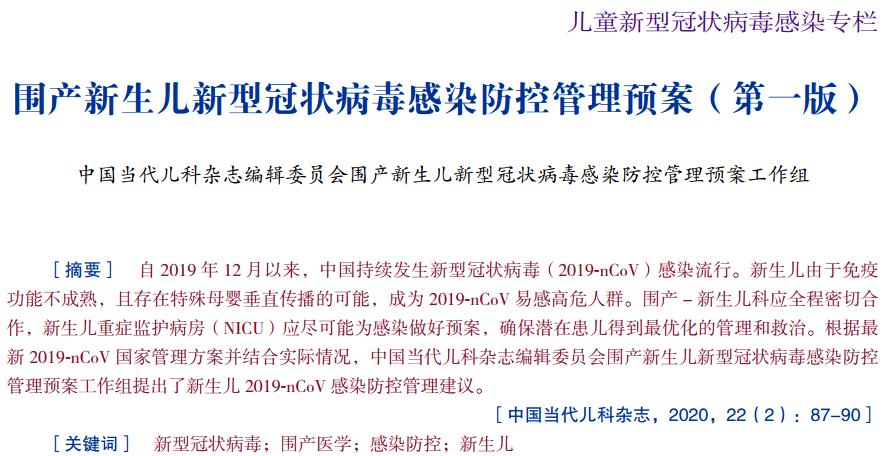 PDF(449 KB)
PDF(449 KB)


Perinatal and neonatal management plan for prevention and control of 2019 novel coronavirus infection (1st Edition)
Working Group for the Prevention and Control of Neonatal 2019-nCoV Infection in the Perinatal Period of the Editoral
Chinese Journal of Contemporary Pediatrics ›› 2020, Vol. 22 ›› Issue (2) : 87-90.
 PDF(449 KB)
PDF(449 KB)
 PDF(449 KB)
PDF(449 KB)
Perinatal and neonatal management plan for prevention and control of 2019 novel coronavirus infection (1st Edition)
Since December 2019, the novel coronavirus (2019-nCoV) infection has been prevalent in China. Due to immaturity of immune function and the possibility of mother-fetal vertical transmission, neonates are particularly susceptible to 2019-nCoV. The perinatal-neonatal departments should cooperate closely and take integrated approaches, and the neonatal intensive care unit should prepare the emergency plan for 2019-nCoV infection as far as possible, so as to ensure the optimal management and treatment of potential victims. According to the latest 2019-nCoV national management plan and the actual situation, the Working Group for the Prevention and Control of Neonatal 2019-nCoV Infection in the Perinatal Period of the Editorial Committee of Chinese Journal of Contemporary Pediatrics puts forward recommendations for the prevention and control of 2019-nCoV infection in neonates.

Novel coronavirus / Perinatology / Prevention and control of infection / Neonate
[1] 新型冠状病毒感染的肺炎诊疗方案(试行第四版)[S]. 北京: 国家卫生健康委 . 2020.
[2] Zhu N, Zhang D, Wang W, et al. A novel coronavirus from patients with pneumonia in China, 2019[J]. N Engl J Med, 2020. Epub ahead of Print.
[3] World Health Organization. Laboratory testing for 2019 novel coronavirus (2019-nCoV) in suspected human cases[EB/ OL]. (2020-01-14). https://www.who.int/docs/default-source/ coronaviruse/20200114-interim-laboratory-guidance-version.pdf ?sfvrsn=6967c39b_4&download=true.
[4] World Health Organization.SARS (severe acute respiratory syndrome)(2019)[EB/OL]. https://www.who.int/ith/diseases/ sars/en/.
[5] Azhar EI, Hui DSC, Memish ZA, et al. The middle east respiratory syndrome (MERS)[J]. Infect Disease Clin North Am, 2019, 33(4): 891-905.
[6] Li AM, Ng PC. Severe acute respiratory syndrome (SARS) in neonates and children[J]. Arch Dis Child Fetal Neonatal Ed, 2005, 90(6): F461-F465.
[7] Gagneur A, Vallet S, Talbot PJ, et al. Outbreaks of human coronavirus in a pediatric and neonatal intensive care unit[J]. Eur J Pediatr, 2008, 167(12): 1427-1434.
[8] Zhang N, Wang L, Deng X, et al. Recent advances in the detection of respiratory virus infection in humans[J]. J Med Virol, 2020. Epub ahead of Print.
[9] Chen Y, Liu Q, Guo D. Coronaviruses: genome structure, replication, and pathogenesis[J]. J Med Virol, 2020. Epub ahead of Print.
[10] Totura AL, Bavari S. Broad-spectrum coronavirus antiviral drug discovery[J]. Expert Opin Drug Discov, 2019, 14(4): 397-412.